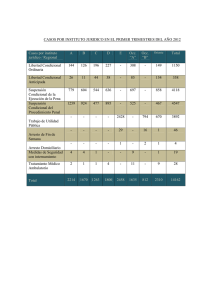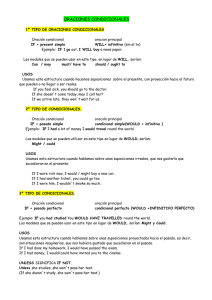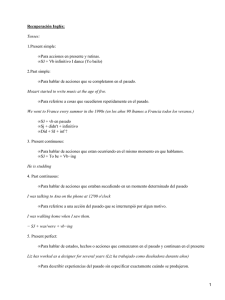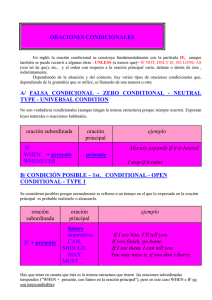Semana 7 Past unreal actions - Radio Fe y Alegría Noticias
Anuncio
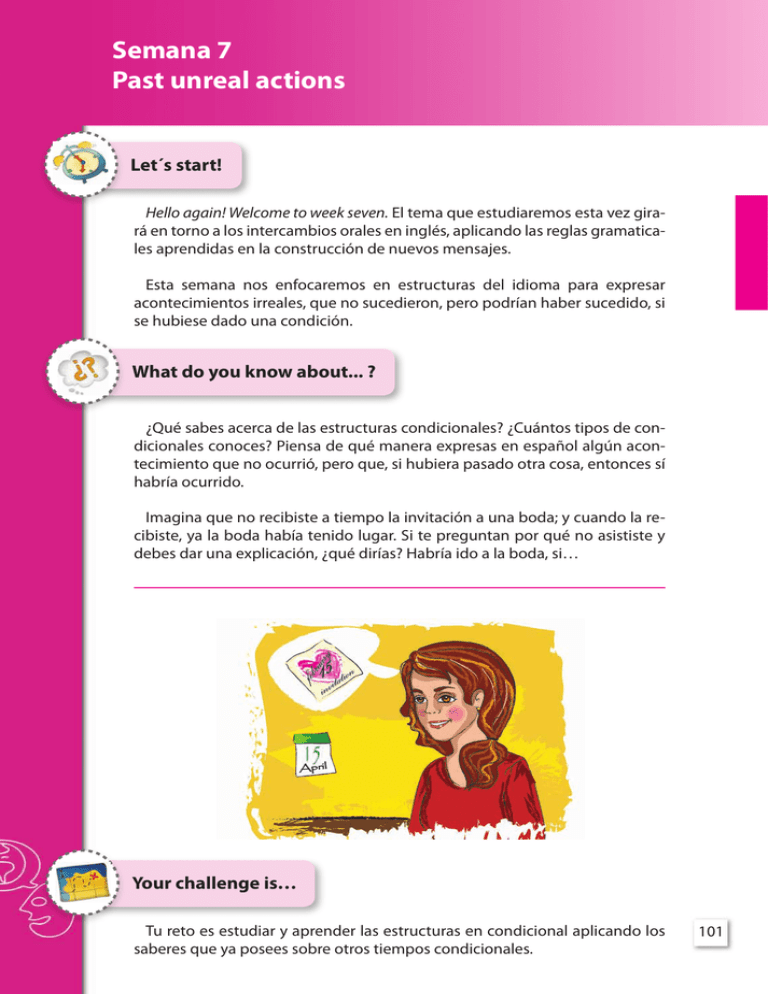
Past unreal actions Semana 7 Semana 7 Past unreal actions Let´s start! Hello again! Welcome to week seven. El tema que estudiaremos esta vez girará en torno a los intercambios orales en inglés, aplicando las reglas gramaticales aprendidas en la construcción de nuevos mensajes. Esta semana nos enfocaremos en estructuras del idioma para expresar acontecimientos irreales, que no sucedieron, pero podrían haber sucedido, si se hubiese dado una condición. What do you know about... ? ¿Qué sabes acerca de las estructuras condicionales? ¿Cuántos tipos de condicionales conoces? Piensa de qué manera expresas en español algún acontecimiento que no ocurrió, pero que, si hubiera pasado otra cosa, entonces sí habría ocurrido. Imagina que no recibiste a tiempo la invitación a una boda; y cuando la recibiste, ya la boda había tenido lugar. Si te preguntan por qué no asististe y debes dar una explicación, ¿qué dirías? Habría ido a la boda, si… Your challenge is… Tu reto es estudiar y aprender las estructuras en condicional aplicando los saberes que ya posees sobre otros tiempos condicionales. 101 Semana 7 Past unreal actions Let´s focus… On past unreal conditional Vamos a repasar nuevamente los tipos de condicionales en inglés y sus usos. Hay dos clases de oraciones condicionales: reales e irreales. El condicional real describe situaciones de la vida real. El condicional irreal describe situaciones imaginarias e irreales, hipotéticas. Este tipo de condicional real ya lo has estudiado, ¿recuerdas? El zero conditional o condicional cero y el first conditional o primer condicional. El segundo condicional, también llamado condicional presente irreal, es usado para hablar acerca de algo que normalmente harías en una situación imaginaria. Ejemplos: • If I owned a car, I would drive to work. (But I don’t own a car). Con el segundo condicional, estamos hablando también de una situación particular futura y el resultado de esa condición. Pero aquí no hay posibilidad real de que esta condición se dé. Ahora, hay otro tipo de condicional irreal, llamado: Tercer Condicional Condicional irreal pasado: situación imposible • “If I had had a car, I would have driven to work every day.” Con el tercer condicional, llamado en inglés past unreal conditional, hablamos acerca del pasado, una situación imaginaria que nunca ocurrió. Es por eso que no hay posibilidad para esta condición. Imagína esta situación: la semana pasada te caíste en la calle porque llovía. ¿Qué habría pasado si te hubieras quedado en casa?. Si me hubiera quedado en casa, Ahora, llena la tabla 8 con la estructura de este condicional. Tabla 8 102 Third conditional / Situación imposible de ocurrir If I had stayed at home, I would not have fell. Si me hubiera quedado en casa, no me habría caído If + sujeto + verbo pasado perCláusula en condicional: fecto + coma Would have + Past participle Semana 7 Past unreal actions Como ya has estudiado antes, en la cláusula IF (if-clause) usamos el pasado perfecto (had +past participle) para expresar la idea imaginada o deseada que nunca ocurrió (pasado irreal). La cláusula resultado, que es la que aparece de segunda en el ejemplo, expresa el resultado imposible; por eso está en condicional y usa would have + past participle. Let´sknow more Para conocer más acerca del modo condicional en inglés, dirígete a la siguiente dirección web: http://li.co.ve/qIt Haz los ejercicios, lee y aclara tus dudas. Apply your knowledge 1. Escribe oraciones usando el past unreal conditional; sigue el ejemplo y usa los verbos en paréntesis. I didn’t own a car, so I took the bus to work. If I had owned (own) a car, I would have driven to work. a) She didn’t have much money, so she never traveled around the world. If she (have) much money, she vel) around the world (tra- b) I did watch a lot of TV, so I never read for entertainment. If I entertainment. (watch) a lot of TV, I (read) for c) Jack was lazy and he didn’t earn much money. If Jack money. (work) harder, he (earn) more d) I wanted to live in Seattle, but I didn’t decide to move to the United States If I (decide) to move to the United States, I (choose) to live in Seattle. 2. Subraya en el texto las estructuras en past unreal conditional que encuentres: Unfortunately, natural disasters are rather frequent. Humans often wish that we were not so helpless in the face of Mother Nature’s power. For example, if there is an earthquake in the middle of the ocean, all nearby countries are vulnerable to tsunamis. If a volcano erupts, ash will enter 103 Semana 7 Past unreal actions the atmosphere, sometimes with long-lasting effects. For instance, ash from the 1883 volcanic eruption of Krakatoa in Indonesia lowered the average global temperatures by 1.2 degrees Celsius for the following year. We all feel especially sad if an earthquake or a tornado occurs in a populated area. Losses can be huge. Even if people escape with their lives, their communities may be destroyed. In the days following the event, shocked survivors may ask questions like “If the city had had stricter building codes, would the school have remained standing?” or “If the warning siren had sounded sooner, could more people have escaped?” After the event, everyone wishes that the disaster had been less severe. Sometimes, however, we hear happy stories. In 2004, a ten-year-old English girl was vacationing with her family in Thailand. She noticed the sea drawing back and heard a strange noise. She had learned in school that if this happened, a tsunami would likely follow. She knew that people can survive this kind of disaster only if they run for high ground immediately. Her family shouted a warning minutes before the wave arrived. Grammar and Beyond Communicative Activities © Cambridge University Press Let´s show what we know… Escribe en español 4 deseos que te habría gustado cumplir, si hubieras tenido la oportunidad. Escribe las 4 oraciones con la siguiente estructura del pasado condicional irreal en español; es muy parecido al inglés: Si + hubiera + participio pasado, habría + participio pasado Ejemplo: Si hubiera tenido mucho dinero, habría viajado por el mundo. Lleva tus oraciones al CCA, intercámbialas con tus compañeros y traduzcan las frases de cada uno al inglés. Ejemplo: -Si hubiera tenido mucho dinero, habría viajado por el mundo. -If I had had much Money, I would have traveled around the world. 104
